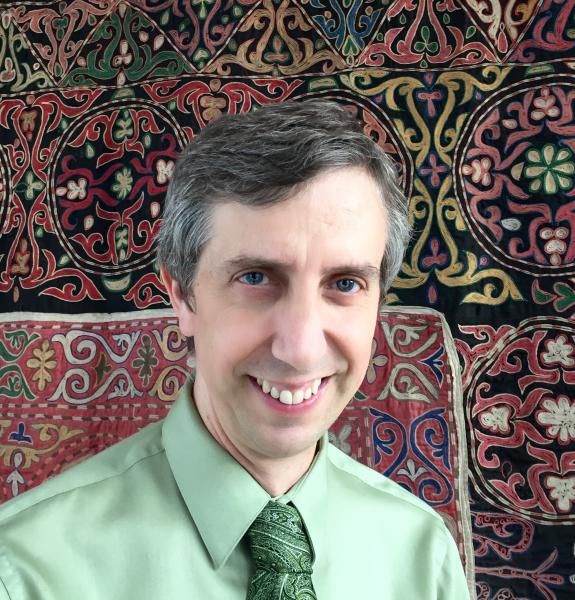Request to co-sponsor an event: In addition to our yearly programming, the Center for Middle Eastern and North African Studies (CMENAS) is happy to consider requests to co-sponsor MENA related U-M lectures, events and activities that coincide with the Center's mission to promote a broad and deep understanding of the region.
Submit your request for co-sponsorship »
CREES Noon Lecture. Between Political and Social Constraints: Christian Movements in Contemporary Central Asia
Sebastien Peyrouse, research professor of international affairs, George Washington University
Although the five Central Asian republics are majority Muslim, they are also home to many Christian—Orthodox, Catholic, Armenian and Protestant—minorities. Most of these communities consist of Slavic or European minorities (Russians, Germans, Poles, Armenians, etc.). In addition, post-Soviet liberalization enabled Protestants to gain a strong footing by converting thousands of Central Asian Muslims. After a brief introduction on the history and presence of Christian movements in the region, this presentation will address the link between religion and nationality, and its impact on the management of Christian minorities by the governments.
For many officials, as well as parts of the Muslim and Christian populations, religious belonging should follow from nationality. However, Christian proselytism has challenged this principle. For years, the Muslim population, ulema, and the Russian Orthodox Church have denounced the increasing numbers of conversions. The governments have responded by introducing numerous legislative restrictions on religious freedom since the 1990, including ban on proselytizing. From the Christian minority prospective, this presentation will explore the contrast between the governments' claims of religious renewal versus the limitations imposed by their religious management policies.
Sebastien Peyrouse, PhD, is a research professor at the Central Asia Program in the Institute for European, Russian and Eurasian Studies (George Washington University) and a senior fellow at the East West Institute. He worked six years in Central Asia and was Research Fellow at Woodrow Wilson International Center for Scholars, Washington D.C. (October 2006-June 2007). His main areas of expertise are political systems in Central Asia, economic and social issues, Islam and religious minorities, and Central Asia’s geopolitical positioning toward China, India and South Asia. He has published several monographs, such as "Christians Between Atheism and Islam: Studies of Religion in Soviet and Post-Soviet Central Asia" (Maisonneuve et Larose, 2003, in French), "Turkmenistan. Strategies of Power, Dilemmas of Development" (M. E. Sharpe, November 2011).
Part of the Minorities series at the Weiser Center for Europe & Eurasia, which focuses on the fates and challenges various minorities face, from ethnic and racial groups to people with disabilities and members of LGBT communities. How do different political regimes come to define groups as minorities, and how do they engage with them as a result? What can the experience of minorities in the other parts of the world teach us?
For many officials, as well as parts of the Muslim and Christian populations, religious belonging should follow from nationality. However, Christian proselytism has challenged this principle. For years, the Muslim population, ulema, and the Russian Orthodox Church have denounced the increasing numbers of conversions. The governments have responded by introducing numerous legislative restrictions on religious freedom since the 1990, including ban on proselytizing. From the Christian minority prospective, this presentation will explore the contrast between the governments' claims of religious renewal versus the limitations imposed by their religious management policies.
Sebastien Peyrouse, PhD, is a research professor at the Central Asia Program in the Institute for European, Russian and Eurasian Studies (George Washington University) and a senior fellow at the East West Institute. He worked six years in Central Asia and was Research Fellow at Woodrow Wilson International Center for Scholars, Washington D.C. (October 2006-June 2007). His main areas of expertise are political systems in Central Asia, economic and social issues, Islam and religious minorities, and Central Asia’s geopolitical positioning toward China, India and South Asia. He has published several monographs, such as "Christians Between Atheism and Islam: Studies of Religion in Soviet and Post-Soviet Central Asia" (Maisonneuve et Larose, 2003, in French), "Turkmenistan. Strategies of Power, Dilemmas of Development" (M. E. Sharpe, November 2011).
Part of the Minorities series at the Weiser Center for Europe & Eurasia, which focuses on the fates and challenges various minorities face, from ethnic and racial groups to people with disabilities and members of LGBT communities. How do different political regimes come to define groups as minorities, and how do they engage with them as a result? What can the experience of minorities in the other parts of the world teach us?
| Building: | School of Social Work Building |
|---|---|
| Event Type: | Lecture / Discussion |
| Tags: | Asia, History, International, Religious |
| Source: | Happening @ Michigan from Center for Russian, East European, and Eurasian Studies, International Institute, Center for Middle Eastern and North African Studies, Weiser Center for Europe and Eurasia |


